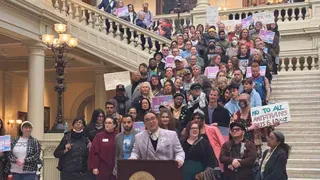
December 11, 2024
Britain Indefinitely Bans Puberty Blockers for Children with Gender Dysphoria
Brian Melley READ TIME: 2 MIN.
The British government on Wednesday indefinitely banned puberty blockers for children with gender dysphoria after independent experts found there was an unacceptable safety risk in prescribing the medication.
The decision, which will be revisited in 2027, effectively bans a common approach to medical gender transitions for youths. It also goes against standards held by medical groups elsewhere, including the European and World Professional Associations for Transgender Health, as well as the American Medical Association and the American Academy of Pediatrics.
The ban will prevent prescribing medications that can suppress or pause puberty in children with gender dysphoria, providing more time to consider options that could include gender reassignment.
The announcement comes after a judge this summer upheld an emergency ban in a ruling that said the treatment was potentially harmful. The emergency ban was put in place by the center-right Conservative government and has now been extended by the center-left Labour government.
The ban does not apply to those already receiving puberty blockers for gender dysphoria, to their use in clinical studies or in treatment of children with precocious puberty, an uncommon medical condition that causes puberty to begin abnormally early.
It applies across the United Kingdom after consultation with the Scottish and Welsh governments, and an agreement with Northern Ireland.
Health Secretary Wes Streeting said a clinical trial will be set up next year to better evaluate use of the drugs.
"We need to act with caution and care when it comes to this vulnerable group of young people, and follow the expert advice," Streeting said.
The National Health Service in England stopped prescribing puberty blockers at gender identity clinics last year, saying there was not enough evidence about the benefits and harms.
In July, Justice Beverley Lang said a review commissioned by the NHS found "very substantial risks and very narrow benefits" to the treatment. She concluded that gender care is an area of "remarkably weak evidence" and young people have been caught up in a "stormy social discourse."
The British Medical Association, which noted that the NHS review was controversial and included patients, academics, scientists and legal experts among its critics, voted to carry out an evidence-led evaluation of that report.
The court challenge was brought by the group TransActual and a youth who cannot be named, according to a court order.
TransActual criticized Wednesday's decision, saying that evidence of danger from 40 years of puberty blockers remains elusive.
"Banning medicines with no evidence of serious harm, only for trans people ... is discrimination plain and simple," said Keyne Walker, the group's strategy director. "Evidence of the harm of the temporary ban continues to emerge, and will grow now that it has been made permanent."







